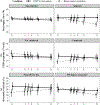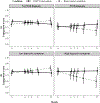Moderating Factors in an Anti-stigma Intervention for African American Women with HIV in the United States: A Secondary Analysis of the UNITY Trial
- PMID: 31218545
- PMCID: PMC6860974
- DOI: 10.1007/s10461-019-02557-x
Moderating Factors in an Anti-stigma Intervention for African American Women with HIV in the United States: A Secondary Analysis of the UNITY Trial
Abstract
African American women experience higher rates of HIV than other women in the United States, and stigma has been identified as an important determinant of engagement in HIV care. Our study examined whether key variables moderated the effect of an anti-stigma intervention on outcomes among African American women receiving treatment for HIV. Twelve potential moderators included: age, years lived with HIV, marital status, employment status, education level, PTSD diagnosis, alcohol use, social support, baseline CD4 count, baseline viral load, and number of children. Outcomes included changes in: HIV-related stigma, social support, depressive symptoms, PTSD symptoms, alcohol use, viral load, and engagement in HIV care. Results suggest that the intervention is associated with greater improvement in engagement in care among participants with PTSD or depression at baseline, and may help maintain engagement in care among participants experiencing certain mental health conditions. This provides opportunities to address discriminatory structural barriers that lead to stigma and drop-offs in HIV care.
En los Estados Unidos, mujeres afroamericanas experimentan tasas más altas de VIH que sus contrapartes no-negras, y el estigma ha sido identificado como un factor importante en esa diferencia. Este estudio analizó el efecto moderador de ciertas variables claves hacia una intervención anti-estigma para mujeres afroamericanas en los Estados Unidos. Del conocimiento previo sobre VIH y el estigma hacia mujeres afroamericanas con VIH, se derivaron doce posibles moderadores incluyendo: edad, años viviendo con VIH, estado civil, nivel de educación, diagnóstico de TEPT, puntuación de AUDIT, apoyo social, conteo de CD4, carga viral, y cantidad de hijos. Las variables clínicas observadas incluyeron estigma, apoyo social, síntomas de depresión y/o TEPT, uso de alcohol, carga viral, y el compromiso del paciente al tratamiento. Los resultados sugieren que la intervención anti-estigma está asociado con mayor mejoramiento en compromiso al tratamiento para esos participantes que padecían de TEPT o depresión al inicio del tratamiento. En adición, la intervención puede ayudar a mantener el compromiso al tratamiento para pacientes que padecen ciertas condiciones de salud mental.
Keywords: African American women; HIV; Moderation analysis; Stigma.
Conflict of interest statement
Figures


Similar articles
-
Exploring HIV-Related Stigma as a Determinant of Engagement in HIV Care by African American Women.J Assoc Nurses AIDS Care. 2020 Mar-Apr;31(2):167-175. doi: 10.1097/JNC.0000000000000140. J Assoc Nurses AIDS Care. 2020. PMID: 31725104 Free PMC article.
-
Internalized HIV-Related Stigma and Breast Health Beliefs Among African-American Women Receiving Care for HIV in the USA.J Racial Ethn Health Disparities. 2020 Feb;7(1):45-51. doi: 10.1007/s40615-019-00632-6. Epub 2019 Aug 26. J Racial Ethn Health Disparities. 2020. PMID: 31452148 Free PMC article.
-
HIV stigma and viral load among African-American women receiving treatment for HIV.AIDS. 2019 Jul 15;33(9):1511-1519. doi: 10.1097/QAD.0000000000002212. AIDS. 2019. PMID: 31259767 Free PMC article.
-
Social and structural determinants of HIV treatment and care among black women living with HIV infection: a systematic review: 2005-2016.AIDS Care. 2018 Apr;30(4):409-416. doi: 10.1080/09540121.2018.1426827. Epub 2018 Jan 28. AIDS Care. 2018. PMID: 29376409 Free PMC article.
-
Older African Americans and the HIV Care Continuum: A Systematic Review of the Literature, 2003-2018.AIDS Behav. 2019 Apr;23(4):973-983. doi: 10.1007/s10461-018-2354-4. AIDS Behav. 2019. PMID: 30519903 Free PMC article.
Cited by
-
Effects of an intervention on internalized HIV-related stigma for individuals newly entering HIV care.AIDS. 2020 Sep 1;34 Suppl 1(Suppl 1):S73-S82. doi: 10.1097/QAD.0000000000002566. AIDS. 2020. PMID: 32881796 Free PMC article. Clinical Trial.
-
HIV-Related Stigma, Social Support, and Symptoms of Mental Health Disorders Among People with HIV Initiating HIV Care in Cameroon.AIDS Patient Care STDS. 2023 Mar;37(3):146-154. doi: 10.1089/apc.2022.0187. Epub 2023 Feb 20. AIDS Patient Care STDS. 2023. PMID: 36802206 Free PMC article.
-
The Influence of Housing Status and Food Insecurity on a Behavioral HIV/STI Prevention Intervention for Black Women under Community Supervision in New York City: A Moderation Analysis.AIDS Behav. 2024 Sep;28(9):3161-3169. doi: 10.1007/s10461-024-04403-1. Epub 2024 Jun 13. AIDS Behav. 2024. PMID: 38869758 Free PMC article. Clinical Trial.
-
Global Systematic Review of Common Mental Health Disorders in Adults Living with HIV.Curr HIV/AIDS Rep. 2021 Dec;18(6):569-580. doi: 10.1007/s11904-021-00583-w. Epub 2021 Nov 18. Curr HIV/AIDS Rep. 2021. PMID: 34792706 Free PMC article.
-
HIV-Related Stigma Research as a Priority at the National Institutes of Health.AIDS Behav. 2022 Jan;26(Suppl 1):5-26. doi: 10.1007/s10461-021-03260-6. Epub 2021 Apr 22. AIDS Behav. 2022. PMID: 33886010 Free PMC article. Review.
References
-
- McDoom MM, Bokhour B, Sullivan M, Drainoni M-L. How older Black women perceive the effects of stigma and social support on engagement in HIV Care. AIDS Patient Care STDS. 2015. February;29(2):95–101. - PubMed
-
- Centers for Disease Control and Prevention. CDC factsheet: HIV among African Americans. 2017. Available from: https://www.cdc.gov/nchhstp/newsroom/docs/factsheets/cdc-hiv-aa-508.pdf. Accessed 2018 Jun 26.
-
- Office of Minority Health. HIV/AIDS - The Office of Minority Health. Available from: https://minorityhealth.hhs.gov/omh/browse.aspx?lvl=4&lvlid=21. Accessed 2018 Jun 20.
-
- Logie C, James Ll, Tharao W, Loutfy M. Associations between HIV-related stigma, racial discrimination, gender discrimination, and depression among HIV-positive African, Caribbean, and Black women in Ontario, Canada. AIDS Patient Care STDS. 2013;27(2):114–22. - PubMed
MeSH terms
Substances
Grants and funding
LinkOut - more resources
Full Text Sources
Medical
Research Materials

